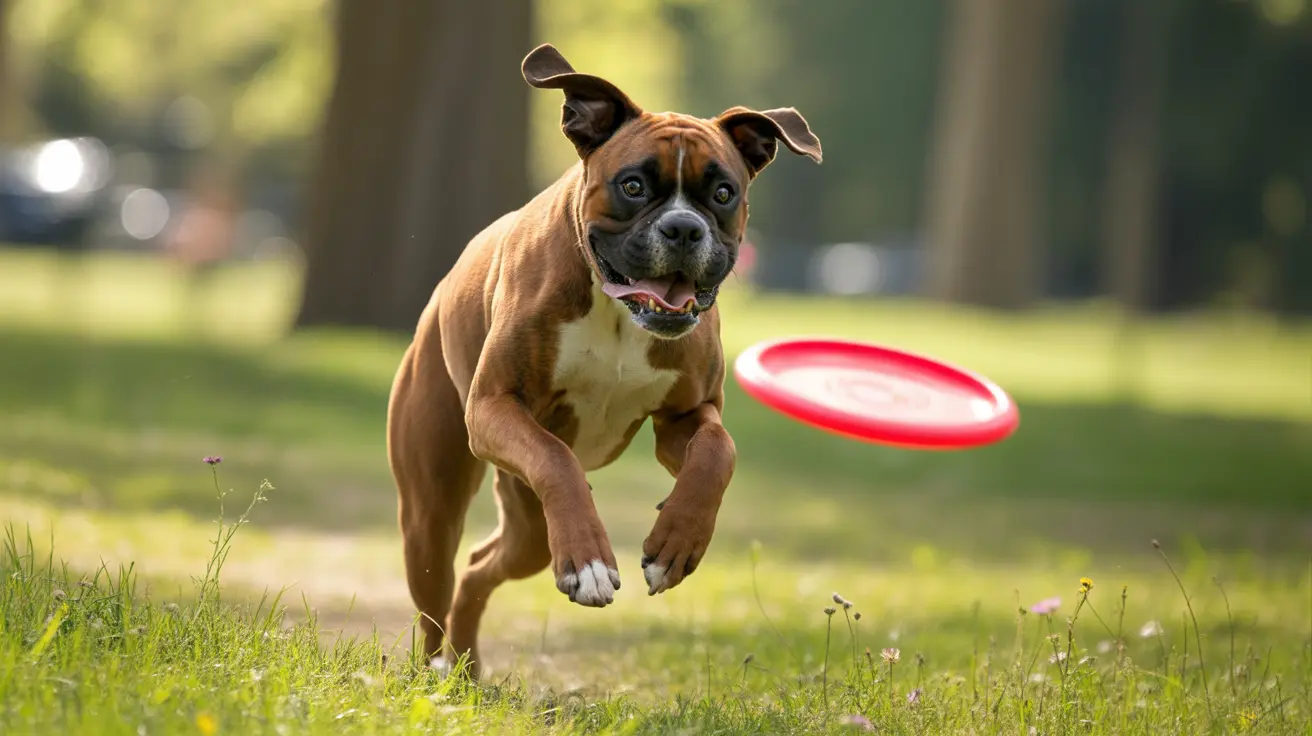The Boxers dog breed stands as one of the most beloved family companions in the modern canine world. These muscular, intelligent, and affectionate dogs combine the best qualities of a loyal guardian and a playful family member, making them an excellent choice for active households.
Originally developed in Germany, these medium-to-large dogs have evolved from skilled hunters to devoted family pets, known for their distinctive square-jawed appearance and incredibly patient nature with children.
Physical Characteristics of the Boxers Dog Breed
Boxers dogs are immediately recognizable by their distinctive appearance. Males typically weigh between 65-80 pounds, while females range from 50-65 pounds, putting them solidly in the medium-to-large size category. Their most striking feature is their square-shaped head with an undershot jaw, giving them their characteristic profile.
The breed sports a short, smooth coat that comes in either fawn or brindle, often adorned with white markings on their face, chest, and paws. Their athletic build features a broad, deep chest and relatively short back, perfect for both work and play.
Temperament and Personality Traits
Boxers dogs are renowned for their exceptional temperament, combining courage with gentleness. Their intelligence and loyalty make them excellent family guardians, while their playful nature ensures they're always ready for fun and games.
These dogs are particularly patient with children, earning them a reputation as outstanding family pets. While alert and protective, they rarely bark without cause, making them ideal watchdogs that won't disturb the neighborhood unnecessarily.
Exercise and Training Requirements
As a high-energy breed, Boxers dogs require regular exercise to maintain their physical and mental well-being. Daily activities should include both physical exercise and mental stimulation to prevent boredom-related behaviors.
While intelligent, these dogs can display a stubborn streak. Training should focus on positive reinforcement techniques, as they respond best to reward-based methods rather than harsh corrections.
Health and Care Considerations
Boxers dogs have relatively simple grooming needs despite their moderate shedding. Regular brushing and basic maintenance are usually sufficient to keep their coat healthy and clean.
As a brachycephalic breed (having a shortened muzzle), they may be sensitive to extreme temperatures and require special attention during hot weather. Regular veterinary check-ups are essential to monitor for breed-specific health concerns.
Frequently Asked Questions
What are the ideal exercise routines for a Boxer dog to prevent boredom and maintain their health?
Boxers dogs need 1-2 hours of daily exercise, including walks, playtime, and mental stimulation activities. Daily walks should be complemented with interactive games like fetch or agility training. Breaking exercise into multiple sessions throughout the day helps prevent overexertion while maintaining their energy balance.
How can I train my Boxer dog using positive reinforcement techniques to address stubbornness?
Use treats, praise, and toys as rewards for desired behaviors. Keep training sessions short (10-15 minutes) and fun. Focus on consistency and patience, avoiding harsh corrections. Clicker training can be particularly effective with Boxers dogs, helping to mark desired behaviors precisely.
Are Boxer dogs generally good with other pets, such as cats, in the same household?
With proper socialization, Boxers dogs can live harmoniously with other pets. Early introduction and positive associations are key. While they have a high prey drive, they can learn to accept other household pets as family members when raised together.
What are the most common health issues that Boxer dogs are prone to, and how can I prevent them?
Common health concerns include hip dysplasia, heart problems, and certain cancers. Regular veterinary check-ups, maintaining a healthy weight, and providing appropriate exercise are crucial preventive measures. Genetic testing can help identify potential health risks early.
How can I ensure my Boxer dog is well-socialized to interact calmly with strangers and other animals?
Start socialization early, exposing your Boxer to various people, animals, and environments during puppyhood. Use positive reinforcement during interactions, and gradually increase exposure to new situations. Puppy classes and supervised dog park visits can help develop social skills.
Conclusion
The Boxers dog breed offers a unique combination of guardian instincts and family-friendly temperament. Their loyalty, intelligence, and adaptability make them excellent companions for active families willing to invest time in their exercise and training needs. With proper care and attention, these remarkable dogs will provide years of devoted companionship and protection.






